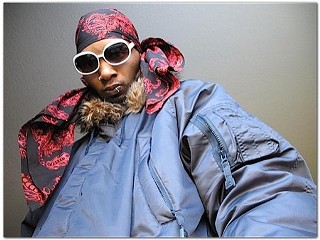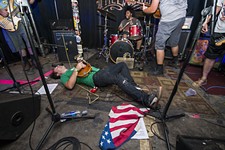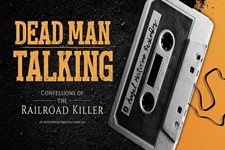Now You Shouldn’t Be Scared
Del tha Funky Homosapien wakes up for ACL
By Chase Hoffberger, 2:00PM, Thu. Sep. 25, 2008
I got this text message an hour after Del tha Funky Homosapien planned on doing a phone interview: "Yeah man, I just passed out. I was recording vocals and next second, zzzzzzzzzz."
In the pantheon of electronic correspondences I’ve shared with rappers, that’s gotta take the cake. Oak-town’s most renowned bizarro switches the game on ACL Friday, 3:30pm on the AT&T Blue Room stage. Here’s trusting he’ll keep his dormancy on hold until nightfall.
Check Yo' Self: You’ve been recording music for so long - 17 years. How do you maintain the desire to go into the studio every day?
Del tha Funky Homosapien: One thing that’s a big factor is that I don’t do it for money in the first place. I do it because it’s kind of a release for me. I think a lot, I don’t have a lot of people to talk to, and I’m kinda hot-headed. At an early age I realized that I can express myself through rhyming and making music, as opposed to socking somebody in the mouth. I need that for some kind of relief. Studying music theory is another huge reason why it stays interesting, because I’m constantly studying every day. There’s always something new to learn. I can play the keyboard pretty good, so a lot of times I’m just sitting around on that.
CYS: What has studying music theory done for your musical development?
DFH: I’ve always been into funk, but now that I can understand music better I’m just kind of trying to tighten up on my funk, get more raw. I’m trying to bleed as much funk as I can out of it, just bend it even more. That’s my main focus. As far as opportunities, let’s just say that they’re there, and if I had to rely on samples they wouldn’t be there at that point. People are just not gonna mess with you now if you’re sampling. The record industry is pretty much totaled, and no one wants to pay any money to clear any sampling or deal with any lawsuits.
CYS: Theory’s allowed you to continue on with a fresh outlook.
DFH: Yeah, and that was my idea about 10 years ago when I realized I was gonna have to start studying something or later on it was over for me. I knew that something was gonna happen. I didn’t know what was gonna happen, but I knew that if I wanted to do music, I better start doing what I was doing. Because there was all these cats in the game, and they knew what they was doing, and they were getting all these platinum records every time they released something.
CYS: Are the classic New York and alternative West Coast sounds suffering because of the record industry’s current state?
DFH: The classic sound to me is based on funk and jazz, anyway. It’s just that stuff sampled, and then they chop it up and do what they do with it. That’s suffering more or less because dudes just took the ball and ran with it, and then really tripped. They found it was a way to make some money, and they just ran it into the ground. And of course the record labels are gonna let you do whatever, because they see what they’re making money off of. Once the public gets the chance to have a choice, they gonna be like, "Forget y’all." And before it was possible to just download anyone’s album before it comes out on the Internet, it was a wrap. OK, I’m not buying your stuff anymore. It was trash. I was waiting for something like this to happen.
CYS: Acts like Radiohead and Saul Williams have shown you don’t need a record label to release a successful album. What are the virtues of signing to a label?
DFH: The only thing [labels] really offer is humongous financial backing, and they can make you a star. If that’s what you want, so be it. But at this point, people are just burnt out on that. I feel like people look at us and think we’re phony. They have the financial backing, but you’re gonna be owing that financial backing later down the road. If you’re willing to play the game, then I guess it’s worth it for you. If you’re more of an artist and you’ve got your own way, and it’s not the way it’s all currently going within the music industry, you might not want to go with a label. People try to change you; they’ll say you’ve got to rap like 50 Cent.
CYS: Why’d you go to Definitive Jux, then?
DFH: I know El-P from a while back; he’s my man. I just agree with his mentality as far as music is concerned. Like I said, that’s my boy. We was in the game at the same time. I needed a way to get [Eleventh Hour] out, and he had that way. I needed to get it out right then and there because it had already been years since I’d been talking about it. So I felt like it if I didn’t get it out now, it was gonna be over.
CYS: What’s it like to go back and do a solo album?
DFH: I’m always doing collaborations. I just finished an album with Tame One from the Artifacts called Parallel Universe. This is something I do just for fun. I’m really just getting back to that, having fun with it, not really tripping so hard about the industry. At this point, there is no industry, so I don’t even care anymore. I’m just out there doing whatever the hell I want to do. The thing that was the big deal about Eleventh Hour was that I had just learned music theory, and I was applying a lot of that to my album. I just had a better outlook and view about what I wanted to present myself as. I felt like I was way more solid. Before, I didn’t realize that there were certain things that I should have in place, for the audience to know. Like, "OK, this is what you’re about. This is what you’re gonna get when you buy my stuff." You can know that. The album took so long to come out because I had these other personal issues in my life that I had to get out of the way - a lot of negativity. People don’t understand that. It’s not their job to understand that or care about what I want to do. So they’re just kinda looking at it like, "Man, he said it was gonna be out seven years ago, and it’s still not out," like I lied or something. That’s why the pressure was on, because a lot of people started feeling like I was lying to them. I just had to get it out so that I could start with a clean slate.
CYS: Did you think it was released unfinished?
DFH: It’s always kind of unfinished. It’s always a work in progress. It could have been better if I had more time to think about things and it wasn’t so hectic around me. I didn’t have that time, so it is what it is. And for what it came out to be, considering the situation I was in, I’m still alive. That in itself is a blessing. I coulda been dead or have killed someone else. The album’s out; I’m good. And I learned all the theory even though I had all these things pulling against me. I like that. I sat back, and I’m pleased with that.
CYS: It’s a good foundation for what’s coming next.
DFH: Yeah, that’s what I wanted to do is strengthen that foundation that I thought I didn’t have before.
CYS: What is coming next is the new Deltron 3030 album, Event II, with Dan the Automator and Kid Koala. How is that project progressing?
DFH: I’m working on the new Deltron album now off and on. It takes some research. You know what I’m saying? And I don’t want to be out on the road and have to be somewhere else, so I’ve just learned not to commit myself to any projects where I know people are gonna be wanting to do something with me until I can do it.
CYS: You’ve said that you already mapped out the lyrical theme for the album. How do you look at an empty slate and determine a direction?
DFH: I got a certain character that I play on a record. It’s like a TV show, and each album is a new episode. I’ve learned to make sure my character doesn’t change too much. That way, when people tune into the show, they get what they paid to see. I’m more concerned with keeping the music consolidated instead of fragmented like it was before. I’ve learned that when you’re buying an album you expect a certain type of music. People get branded for a certain reason. If I’m buying a Redman album, I’m buying it because he’s doing something for me for that certain mood. If he gives me some mood from Jefferson Starship or something, I’m saying, "Hold up. That’s not what I bought this for." I’d feel cheated. I felt like a lot of people like me, but sometimes they didn’t buy my album because they were worried I’d throw some crazy stuff at ‘em they wouldn’t be into.
CYS: Is it easier to forge that direction with guys like Dan and Kid Koala?
DFH: As far as Deltron, that works easier because I can rap over anything. Anything that Dan does is gonna be tight. I don’t need to sit over him and be like, "Nah, that beat ain’t right." I’m like, "Give me some beats, I’ll give you some raps, and it’s done." I just let him do his thing, and same with him. He trusts me with my raps. He knows I ain’t gonna write something whack. He knows I’m gonna put all my thought into it. That’s why he’s working with me anyway.
CYS: What are your thoughts on the Pharcyde reuniting for the Rock the Bells tour?
DFH: I’m like this man: I know the Pharcyde. I’ve known them cats for a while. So if it works out for them personally, then that’s cool. I know they have issues with each other. For me, I understood why they weren’t together any more, so I didn’t have a problem with that. I talked to them separately. If they’re together and it works, then fine. If you’re talking about anybody getting back together, like EPMD, that was tight when they got back together, because I hella liked EPMD. When they got back together, it was like they were showing something to the rap community.
A note to readers: Bold and uncensored, The Austin Chronicle has been Austin’s independent news source for over 40 years, expressing the community’s political and environmental concerns and supporting its active cultural scene. Now more than ever, we need your support to continue supplying Austin with independent, free press. If real news is important to you, please consider making a donation of $5, $10 or whatever you can afford, to help keep our journalism on stands.
Nov. 16, 2018
ACL 2008, Del tha Funky Homosapien












